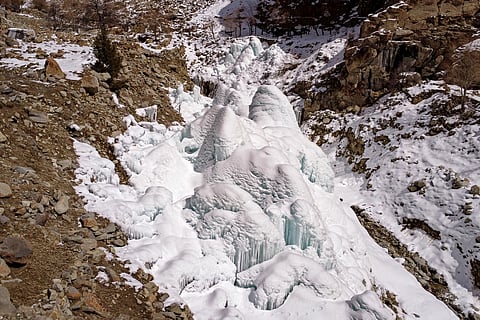Water disputes challenge Pakistan’s fractious unity
A sustainable water-sharing arrangement can only be achieved through cooperation and trust

The disclosure of the federal government’s plan to construct six canals under the Green Pakistan Initiative is now causing increasing discord between Pakistan’s two biggest provinces. Five out of six canals will draw water from the Indus (Sindh) river after which the province is named. The initiative aims to develop these canals to irrigate approximately 1.2 million acres of barren land in Southern Punjab.
While aiming to boost agricultural productivity and economic development, the project has intensified inter-provincial tensions, due to concerns over water distribution and environmental impact.
Protests have started across Sindh, with activists, political parties, and civil society organisations demanding the federal government halt the projects. They argue that the canals threaten Sindh’s water security that could lead to environmental degradation, particularly in the Indus Delta region. In March 2025, the Sindh Assembly passed a resolution against the initiative, reflecting widespread concern over potential adverse effects.
Leading the charge against these canals is the Pakistan Peoples’s Party (PPP) under Bilawal Bhutto Zardari - the nominal coalition partner at the federal level, which draws its support from Sindh province.
Bilawal warned against attempts to divide the nation through such projects, declaring, “they want to break the Indus River to divide us, but we will not let that happen.” He called for unity among nationalist groups opposing the project and demanded that the government allow the Indus River to flow freely.
Economic lifeline
Water is Pakistan’s economic lifeline. It’s agrarian economy heavily depends on the Indus river system. Agriculture accounts for about 19 percent of Pakistan’s GDP and employs nearly 39 per cent of the labour force. Any disruption in water availability could have severe economic consequences, including reduced agricultural productivity, food insecurity, and increased rural unemployment.
The recently released UN World Water Development Report 2025 paints a grim picture of retreating Himalayan glaciers that imperil the future of billions dependent on glacial melting. With glacier retreat 65 per cent faster during 2011-2020 compared to the previous decade, the report describes the situation in the region as “alarming.”
“On World Water Day last month, Sindh was struggling to manage a 51 per cent shortage in water flows. Some canals were receiving 70 per cent less than the required discharges”, according to Naseer Memon, a civil society professional.
Meanwhile, in a petition filed by Senator Zameer Ghumro the Sindh High Court has stayed the certificate of water availability, for the proposed canals, issued by the Indus River System Authority (IRSA). He contends that IRSA’s current composition is unlawful due to the absence of a federal member from Sindh, as mandated by the IRSA Act of 1992 and a 2000 executive order. This alleged irregularity, he argues, renders IRSA’s decisions, including the issuance of the water availability certificate on January 25, 2025, invalid. The court has sought a reply from the federal government by 18 April.
History intertwined with water
Pakistan’s history and socio-political fabric are deeply intertwined with its water resources. The country’s geography and economy have been shaped by the Indus River system, which has long been a source of both sustenance and strife.
The persistent inter-provincial water rivalries, particularly between Punjab and the other three provinces — Sindh, Balochistan, and Khyber Pakhtunkhwa — underscore a deep-rooted problem. The current tensions surrounding the construction of canals in Southern Punjab highlight how water management has become a politically charged and a potentially dangerous issue.
Water disputes in Pakistan are not merely about resource allocation; they also reflect deep-seated psychological and political tensions. Punjab’s dominance over water distribution fuels perceptions of injustice among the smaller provinces. The psychological aspect of victimhood plays a crucial role, particularly in Sindh, which sees itself as historically wronged by Punjab centric water policies.
The persistent water disputes hinder long-term investments in infrastructure. The lack of consensus on large-scale irrigation schemes means that Pakistan continues to suffer from inefficient water management that has led to increased reliance on groundwater extraction, causing depletion and quality deterioration. Cities like Karachi face acute water shortages, forcing residents to rely on expensive private water tankers, increasing economic burdens on the urban middle class and poor.
In the backdrop of these shortages in Sindh the decision to construct canals for irrigating Southern Punjab has further aggravated inter-provincial tensions. The reluctance of the federal government to convene the Council of Common Interests (CCI), the constitutional body responsible for resolving inter-provincial disputes, only exacerbates the issue.
Long-term solution
A long-term solution requires investing in modern irrigation systems, improving water storage capacity, and adopting efficient water conservation techniques. Public awareness campaigns, scientific research, and community participation in water management can also play a vital role.
Most importantly, Pakistan must move beyond the politics of dominance and victimhood. A sustainable and fair water-sharing arrangement can only be achieved through cooperation, trust, and a recognition of the interdependence of all provinces. Failure to address these issues in time could push the country toward a crisis with far-reaching consequences, threatening both its unity and economic future.
The federal government must take proactive measures to address provincial concerns and ensure equitable water distribution. Convening the Council of Common Interests is a crucial first step in fostering dialogue and consensus-building.
- Sajjad Ashraf served as an adjunct professor at the Lee Kuan Yew School of Public Policy at the National University of Singapore from 2009 to 2017. He was a member of Pakistan Foreign Service from 1973 to 2008 and served as an ambassador to several countries.





